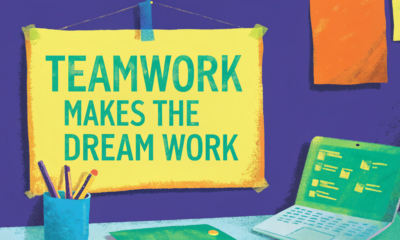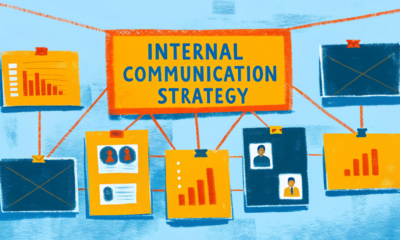Productivity
How to Motivate Your Team to Get Things Done Together

Motivated teams work better together. They’re happy with their work environment. They’re happy with themselves. Naturally, they’re more productive. It’s great news for everyone involved.
However, motivation is fickle. It’s not easy to pump up your employees, keeping them eager about the day ahead every single day.
So, how do you inspire your employees every day so they bring their best selves to the forefront? Here’s how.
Appreciate your employees
In a study conducted at MIT, participants were given papers filled with random letters. The task? To find pairs of identical letters. Participants were divided into three groups with the experiment conducted over several rounds. With each round, participants were offered less money than the previous round.
For the first group, those involved were asked to write their names with their submissions. The experimenter looked over the results and said “great” before putting the papers in a pile.
People in the second group didn’t write down names. The experimenter put the sheets into a pile without even glancing at them. For the third group, the researcher shredded the work immediately.
People who got their papers shredded demanded twice as much money than the people from Group 1. For the second group, participants needed nearly the same amount of money.
The verdict is clear. If people don’t feel appreciated, they turn grumpy. The same is the case with your employees.
Keep workplaces free of slang
The world today allows a relatively free exchange of talent and resources. People are moving from one place to another all over the world, seeking new avenues to do their jobs.
That means a team’s granular makeup includes representatives from all nationalities. If workplace communication is ridden with slang, it can be difficult for international employees to understand what’s being said, which can hamper productivity.
A workplace free of slang helps ensure clarity, fosters mutual respect, and contributes to a more inclusive atmosphere. When everyone can understand one another without confusion or ambiguity, collaboration improves – and so does morale. It also avoids creating in-groups or cliques based on shared cultural references, which can make others feel excluded or marginalized.
Making a conscious effort to keep communication clear and slang-free isn’t just about avoiding misunderstandings – it’s about building a work culture where everyone feels like they belong. That’s the kind of culture worth putting in your mission statement.
Understand that meetings are useless and fix that
There’s a lot of excitement surrounding DevOps. The idea is to streamline each and every part of the process to generate the highest levels of productivity. If existing tools aren’t enough, use other tools to streamline things.
DevOps has its uses, but again, implementing DevOps riddles your time with pointless meetings about endless things. Even without DevOps, meetings tend to remain a big part of the present work culture.
Despite that, meetings don’t do much. The way meetings are conducted today wastes tons of time. You often go right back to where you started.
The very idea of having to attend another meeting is demotivating to most people.
To ensure you eke out at least some productivity, create an agenda for your meeting and distribute it before the meeting begins. Invite only those who really need to attend and don’t keep going at it pointlessly. Remember the goal is not to conduct meetings for namesakes but for propelling growth. Meetings are best conducted to discuss the primary goals you have in mind.
Set clear goals
Another study found that employees wasted their time because they didn’t know which part of the work was their topmost priority. It’s your job to invite people and members of your team and talk clearly. Once you and they know what the goals are, write them down as part of a presentation so that there’s a physical copy of it to go around and refer to. A clear visual guide not only reinforces the message but also provides a constant reminder for everyone about the bigger picture.
With that done, ensure each team member knows what the priorities are. Be transparent about deadlines and milestones, and ensure that everyone has access to the necessary resources to meet those goals. Regularly check in on the progress to keep everyone aligned. It’s not just about setting goals, but also about fostering a sense of ownership and accountability among the team. When they understand how their tasks contribute to the larger objectives, they will feel more invested and motivated to succeed.
Don’t micromanage
Micromanaging kills motivation. Nobody likes being watched over their shoulders and being told what to do. 38% of employees in a survey reported that they’d rather prefer difficult tasks to being with a boss who micromanages them. It’s important to trust your team’s capabilities and give them the space they need to perform. This not only helps them develop their problem-solving skills but also boosts their confidence.
Providing clear expectations and the right support is all they need to take initiative. Instead of hovering over them, offer your assistance when necessary and celebrate their successes. When team members feel trusted to execute their own work, they become more engaged and empowered. Remember, your job as a leader is to guide and coach, not to control every aspect of the work.
Pay your people what they are worth
Next, pay people what they’re worth. Your employees (millennials in particular) have no qualms leaving their cushy jobs if they get a higher salary elsewhere. Be competitive in what you’re paying your employees rather than cutting costs. Not paying them what they’re worth only results in a great deal of dissatisfaction for your employees killing productivity.
Offer not only fair salaries but also comprehensive benefits that show you value their contributions. Consider investing in wellness programs, professional development opportunities, or performance bonuses as incentives. When employees feel their compensation reflects their value, they’re more likely to stay committed and loyal. Competitive pay fosters a sense of fairness and appreciation, which is critical for long-term productivity and retention.
Don’t discourage employees on failure
Failure is also part of being human and being an employee. There are important lessons in each failure. When we fail, life teaches us lessons so that we don’t repeat them again. In the workplace, failure can be an opportunity for growth. If handled well, it can build resilience and adaptability in your team members. Encourage a mindset that views mistakes as part of the learning process rather than as a setback.
Mistakes are part of the learning experience. The goal should be to encourage people not to make these mistakes again but to learn from them and improve. Foster a safe environment where employees feel comfortable taking calculated risks without the fear of harsh judgment. When failure is treated as a stepping stone to success, employees are more likely to approach their work with creativity, innovation, and determination.
Encourage regular breaks
It’s easy for employees to feel burned out. Piling tasks atop another doesn’t help anyone; it only makes them feel even more burned out. Research shows that being allowed to step away from the desk improves brain power among employees.
The best way to optimize motivation and productivity is to give employees a free hand. Encourage employees to take regular breaks. The benefits? Regular breaks clear their minds and enable them to come back fresh and complete the task when ready.
Being attached to a desk doesn’t promote productivity. If they feel the need to rest, allow them to step away, step outside, and perhaps walk or stretch themselves to get more excited about their work. Happy employees bring a spark and positivity that improves the customer experience as well.
Break up tasks
Second, break up heavy tasks into easy little chunks. Small tasks are much more manageable, and they’re easy for your employees to work on together.
Learning time management can help your employees reduce their stress and train productivity of each day. Encourage them to break up tasks, have a to-do list, calendar or diary management skills. Knowing which tasks are at hand reduces the risk of downtime and keeps things on schedule.
A handy list makes it way easier to know which jobs to complete. Plus, notify your employees if there are any updates or decisions on plans and tasks, even the smallest ones. This will keep them in the loop and allow them to adjust their to-do lists promptly.
Encourage a sense of camaraderie
Moreover, talk to people and learn from them. Your employees are full of ideas on how to make the job experience much more enjoyable and listening to them is a fantastic way to improve the workplace. This will also help them network better both internally and externally, say in tasks that involve reaching out to bloggers.
Encourage the team to talk to each other and build a strong relationship. Effectively communicating your outlook is the best way to encourage feedback and a sense of purpose. Freedom to talk buoys happiness levels to a great extent. It keeps stress at bay.
Conclusion
Motivating your employees is not all about encouraging them with positive words. It’s also about giving them the right incentives, apt wages and staying away so they can bloom into their full selves.
People do their best work when they feel trusted and supported – when their value isn’t just spoken, but shown. That means stepping back enough to let them take ownership, while also building a structure that respects their time, effort, and emotional energy.
If the workplace becomes too controlling, too tightly managed, or too full of empty praise without fair compensation or real autonomy, employees may start to feel stifled. That lack of space – mental, emotional, and practical – can slowly chip away at their well-being. Over time, that’s what leads people to leave, even if they once loved the job.
A strong workplace makes room for people to grow, to feel safe, and to be seen for who they are – not just what they deliver.
Give people the conditions to thrive, and they’ll take it from there.
Productivity
How to Be Productive at Home?

According to a survey by Workopolis, 90% of people believe that telecommuting contributes to more productivity. However, these are the people who have had a practice of working from home, unlike most employees today, who find themselves in an unprecedented situation in the year 2020 as a global pandemic rages and their bosses have ordained work from home as mandatory.
Initially, the new work order and the opportunity for telecommuting may seem like a heaven-sent miracle. Your boss, who was previously averse to approving a work-from-home request, may now be emailing everyone about the benefits of working from home, and you might be thrilled with the idea of how to be productive at home. However, it’s important to remember that being productive at home requires discipline, focus, and a structured approach to your workday.
However, you may not have been prepared for the potential death of your productivity as soon as you started telecommuting and working from home, and you might be wondering how to be productive at home. After all, we were used to the hullabaloo of the workplace, to the stern eye of our bosses, face-to-face discussions and debates, a dedicated workspace equipped with all the required paraphernalia, and fun break times.
Now that you’ve been telecommuting for weeks or even months, you may be realizing that the new work setting isn’t as motivating as you had hoped, and you might be wondering how to be productive at home. Despite your best efforts, you may be facing myriad unforeseen obstacles at home that bludgeon your productivity as if it’s its mortal enemy.
Things that distract you at home
It’s easy to recognize what’s taking you away from work in a professional space, but at home, your every personal issue fuses with your work; there’s no clear boundary. Chances are that you aren’t even aware that certain things are hitting your productivity like nothing else.
So being aware and recognizing distractions as they are may enable you to avoid them during crucial working hours.
Home Chores: Chores are your excuse for delaying in getting started with the newest assignment looming over your head. You used to do laundry, cook, and clean even when you were going to the office, then why are you letting these chores interfere with your work at home now? Set aside a specific time to do these chores.
Family Members: No one can avoid them while at home, and especially when you have little kids who are quite demanding of your time. You will need to be strict about when you can interact with them at home if you are serious about boosting your productivity.
Once you know what external distractions are inhibiting your productivity and have dealt with them accordingly, you may now want to focus on internal elements, i.e. concerned with yourself and are a roadblock to your productivity.
Here are a few strategies you need to go about:
Accept it as the new normal
Many of us have a hard time digesting the fact that telecommuting and working from home is going to be our new situation for a while, and we may be struggling with how to be productive at home. When we think that the situation is temporary, we may blame our lack of productivity on the current environment. “Things are going to fall into place once we get back to work,” we tell ourselves.
But the reality is that we are going to be working from home for some period of time, and we must make the best out of it by treating our current workspace as the real one.
Start your day with some energizing boosters
How you begin your day really predicts the tone of the rest of your day. Woke up late? You’re going to feel lazy all day. Feeling groggy? Can’t concentrate on work? Let’s procrastinate by doing house chores.
- You need to set up a specific time you wake up on. Sure, it doesn’t have to be the ungodly hour you used to wake up at, so you could have ample time to commute to work. Give yourself a little leeway here, get that much-needed sleep, but do it in a timely manner.
- Start your day with some good ole’ exercise, anything that suits your pace and energizes your mind and body. A study at the University of Bristol found that people who are in the habit of exercising during the workday have ample energy and a positive outlook to conquer the workday.
- Before you get your shot of caffeine, have some lemon juice with warm water first. If your health doesn’t permit to consume the drink, make up a nice healthy smoothie. There are myriad benefits of lemon water, including the improvement of nutrient absorption in your stomach and energy that lasts the entire day. Also, keep a gap of 15–20 minutes between the lemon water and your breakfast— you can even exercise during that time.
- Now have that most important meal of the day. Ever heard anyone prescribing you to skip breakfast? No. Then, you have no excuse to avoid it. Plus, when you get over the food part, you are not going to get distracted with hunger pangs while working.
- Also, stay away from those screens until you are done with your breakfast. News, social media, e-mails, or texts, tend to take away the precious peace and calm of the early morning time as you jump headfirst into the frenzy of the outside world. So give yourself that me-time, or else you’ll be longing for that break throughout the day.
Dress yourself and your work space
How can you bring yourself to work at home when you are dressed in your night suit and have your work laptop placed on your unmade bed? Not very motivating as you get those casual home vibes while working, and you can easily fall into the routine of working ungodly hours in order to meet a deadline while telecommuting.
So, if you want to know how to be productive at home, as you wake up, dress in your work gear and set up your workspace where there are no distractions. That means a clean uncluttered desk free of dirty mugs, old sticky notes, half-eaten snacks, etc. Make your workstation as professional and conducive to productivity as possible.
You would actually feel that you are at work in a professional setting. Plus, the anticipation of shedding that work uniform after a long day and getting into your comfy clothes and bed would be a good motivation to get your work done quickly.
Stay connected with your team
One of the unexpected downsides of working from home is how easy it is to slip into isolation without even noticing it. Gone are the impromptu hallway chats, the shared laughs over coffee, and the comforting presence of colleagues sitting just a desk away. And while you may be plugging away on tasks and hitting deadlines, the emotional gap from your team can silently chip away at your enthusiasm and drive.
That’s why it’s important to intentionally recreate moments of connection. Make time for informal check-ins that aren’t just about project updates – ask your teammate how their weekend went, send a meme, or start a quick video call just to catch up. You can even suggest a virtual coffee break or Friday afternoon hangout where work talk is off-limits. These small interactions help nurture camaraderie and remind you that you’re still part of a team with shared goals. Plus, regular communication fosters accountability and helps clear up confusion that could otherwise snowball when everyone’s working remotely.
Set your daily goals
A little bit of planning can go a long way in getting things done throughout the day. A case study reveals that 98% of executives attribute their success to ‘results of plans and strategy’. Another concluded that concrete goal defining tends to instill 50% more confident about achieving their goals and 32% more in control of their lives.
Besides, a sense of control tends to generate a much-needed ‘grit’ that enables most of us to persist and attain what we set out to do.
Setting specific goals and deadlines for the day is crucial when working from home. This will help you stay focused and motivated throughout the day, and avoid distractions that can eat up your time. By breaking down your goals into specific tasks and allocating a certain amount of time to each task, you can manage your time effectively and avoid overworking yourself. Remember, being productive at home during telecommuting requires a different mindset and approach than working in the office, but with the right strategies, it is possible to maintain a high level of productivity and achieve your goals.
Do one thing at a time
One thing that badly demotivates us and puts us off from our goals is the unnecessary load that stems from multitasking. Accept it that when you dive into several things at once, you end up pulling your hair from stress while achieving nothing. Even when you get things done, they are missing the quality level that would have been otherwise present if you had directed all your energies at that particular task.
So stop yourself if you find that you’re two or three things at once. That means getting things done within the deadline. No harm would befall if you complete it long before the deadline, so you aren’t overwhelmed at the last moment struggling with a bunch of those at once.
Don’t let yourself burnout at home
Most people have the image that working from home is undemanding and uncomplicated, due to which you would experience more pressure from the top-level management to achieve more results. Consequently, you will end up working longer and more strenuous hours than you used to. This can affect your productivity, and it’s important to understand how to be productive at home and while telecommuting.
Moreover, no one even considers the responsibilities of home life thrown into the equation amid a pandemic, which on the top isn’t allowing you to socialize and cool off like before. So it’s easy to lose track of the amount of time you’re spending working and how much you’re dedicating to home life.
It falls upon you to focus on your work within allocated hours of your job, and communicate with your boss if you’re being overloaded. Learn to say No, when things are going out of hand, and avoid utilizing phrases such as, I don’t think so, let me see, etc. It’s important to set boundaries and establish a routine to balance work and home life when telecommuting.
Research by the University of California, San Francisco, concluded that the more trouble you have conveying the word ‘No’, the more likely you are going to be prey to stress, burnout, and even depression.
Work on a combination of easy and difficult projects
You may end up working on difficult tasks at once in order to alleviate the ennui you have begun to experience since work from home started, but rest assured, your brain will get used to this level of intensity and you will eventually end up bored again.
These constant extreme levels of the workout will leave you burned out and unsatisfied. So it is essential that you create a balance as you start on with your tasks. Include a good combination of difficult tasks that will keep you adequately challenged for the day, and throw in some easy tasks that let steam out.
Balancing easy and tough tasks helps maintain focus and motivation. After completing a challenging assignment, tackle something lighter like replying to emails or organizing your calendar. This gives you a mental break while maintaining productivity. Breaking the day into manageable chunks also provides a sense of accomplishment, boosting your mood and energy. Adjusting your task list based on how you’re feeling is key to staying productive without burning out.
No deviation until you’re done with at least one important task
E-mails, texts, phone calls, or even indulging in lunch preparations for the day are a part of your procrastination habit. One sure thing to put a stop to procrastination is doing the ugliest and the toughest job at the first opportunity.
That means strictly no deviation from the set task, you can cool off with those mundane chores once you are done. By diving straight into the most challenging task, you’ll not only build momentum but also experience a sense of accomplishment that propels you through the rest of the day.
Furthermore, setting this “no deviation” rule creates a strong mental framework. It reduces the temptation to drift away from your focus, keeping distractions at bay. A simple trick to make this easier is using the Pomodoro Technique – working in intense, focused bursts (usually 25 minutes) followed by a short break. This allows you to stay concentrated while also ensuring that you’re not overburdening your mind.
Start virtual socialization
According to the 2018 State of Remote Work, remote working employees claim that loneliness is the biggest drawback to the remote working environment.
You transitioned from a traditional office setting, where there were frequent face-to-face informal discussions and fun-fueled lunch breaks, to an environment, where there is nil interaction unless you pop a non-work-related message to your favorite colleague.
This pitiful level of socialization can drive even the staunchest introvert out of their minds. So you and your team must ensure to socialize over a good quality internet connection and have casual non-work-related conversations to cool yourself off and foster a sense of community belonging.
Interactions with the family are good and all, but no one else can empathize with the annoyance and problems you face at work like your colleagues.
So set a specific time when you all can video call through a private channel, maybe have a virtual lunch together? Moreover, you can add to levity and laughter with online game-based group quizzes through apps.
In a case study from the Bank of America call center, those employees who shared breaks together and indulged in casual fun discussions together were more successful with a 15-20% boost in productivity, a 19% decrease in stress levels, and even less turnover.
End your day at a decided time
As discussed before, work from home tends to blur the lines between home and work life. You often lose track of how much time you are dedicating to which and which. Moreover, if you start late, you are definitely going to have to stay late and put a tick mark on all those daily tasks.
The flexibility of work from home can leave you burned out and stressed instead of productive and fulfilled, so you would have to summon all the discipline you have and set a time when you are going to open and close that laptop.
Don’t be lenient towards an unnecessary task that requires your attention towards the end of your workday, you used to leave them for tomorrow when you set out for home, you are going to leave them alone now as you go and spend some quality time with your family or even yourself.
Celebrate while you have it
No matter how your day goes while telecommuting, it is crucial to know how to be productive at home and make sure to celebrate what you have. Work from home is a blessing that many of us are not giving its due during a global pandemic, and it can be challenging to stay motivated. Even during normal days, flexible working time isn’t granted so easily. So consider it a gift and celebrate the opportunity to better yourself for the upcoming future by creating a productive workspace, setting specific goals for the day, and learning how to manage your time effectively while balancing home life and work responsibilities.
Be kind to yourself
Let’s face it – working from home under normal circumstances is one thing. Working from home during a pandemic or crisis? That’s an entirely different beast. You’re not just adapting to a new workspace; you’re navigating a whole spectrum of emotions, uncertainties, and responsibilities that weren’t there before. And if your productivity has taken a hit, you’re definitely not alone.
It’s easy to feel frustrated when you’re not performing at your usual level. Maybe you’re missing deadlines, losing focus more often, or struggling to stay motivated. The key here is to cut yourself some slack. This is a marathon, not a sprint, and it’s okay to have off days. What matters is not being perfect – it’s being consistent in trying. Build habits that serve you. Give yourself permission to step away when you need to. Take breaks, breathe, reset. Working from home isn’t just about hitting KPIs – it’s also about protecting your mental and emotional bandwidth.
Some days will be messy. But if you approach those days with self-compassion instead of self-criticism, you’re far more likely to bounce back stronger.
Productivity
7 Tips to Implement Work From Home Policy in Your Company

Implementing a work-from-home policy has been a solution for numerous companies in addressing the prevalent issue of burnout. Failure to provide employees with remote working options has resulted in mass resignations for some companies unwilling to adapt.
However, you can avoid this scenario. If you want to keep your skilled workforce and keep up with the remote working trends, then you are in the right place. This article will provide you with comprehensive information on how to organize remote teams. Let’s delve into it.
Why you need a work from home policy
Remote work isn’t just a luxury anymore; it’s become an integral part of how businesses thrive in the modern world. A strong work-from-home (WFH) policy isn’t just about offering flexibility — it’s about giving employees the tools and structure they need to excel, wherever they are.
A solid WFH policy helps cultivate a work-life balance that’s not dictated by office hours. By cutting out the commute, employees gain time to focus on personal goals, improve their well-being, and become more productive. When employees are happier, they’re more engaged, which translates into better results for the company.
A well-crafted remote work policy also opens up opportunities to tap into a global talent pool. Companies no longer need to be limited by geographical constraints, and the range of perspectives and ideas that come with a diverse workforce can drive innovation and creativity.
But a WFH policy isn’t just about offering the freedom to work from anywhere — it’s about making sure employees have everything they need to thrive. That’s where companies like Twitter and Ctrip come in. They’ve both crafted remote work strategies that support their teams, showing how a thoughtful approach can lead to success. Let’s explore how they’ve made remote work work for them.
Twitter and Ctrip: companies that adopted remote work
In the realm of work from home policy, numerous companies have employees working remotely, and their sizes can range significantly. For the purpose of this section, we will focus on two companies in particular. The first is a well-known tech giant that you’re already familiar with, and the second is a relatively unknown company.
We’re going to compare approaches, gauge their respective results, and see what insights we can get from their experience. Let’s start off with the multibillion-dollar tech company that played a big role in revolutionizing the social media landscape.
Twitter, undeniably one of the largest tech companies globally, has implemented a work from home policy and even facilitated the transition for its employees. Instead of purchasing equipment for its employees, Twitter opted to let them handle the setup process themselves.
How does this ease the transition, you ask? Well, Twitter reimbursed employees for the costs they incurred during the home office setup. The cashback policy covers everything from desks, ergonomic chairs, printers, and other home office equipment that their employees may need.
Even any online fees that their employees may incur from video conferencing services, data consumption, or project management software will be covered by the company. Twitter is a shining example of how to make a remote transition as easy as possible for employees.
Ctrip
Back in 2016, a Chinese travel agency that employs 16,000 people wanted to explore the feasibility of a remote working system to see if it could reduce overhead costs and/or increase productivity amongst their staff.
They started by assigning small groups from their call center department to a home-based arrangement. The early results were quite promising since there was a drop in resignation rates, better overall performance, and even an improvement in morale based on employee feedback.
The implementation of a work from home policy led to significant cost savings for the agency, amounting to $1,000 for each employee who transitioned to remote work. This was achieved by freeing up office space that the employee would have otherwise occupied. Following the positive initial results, Ctrip extended the policy to the entire agency.
However, upon its implementation, a surge of complaints was received from employees. It is noteworthy that the majority of the complaints centered around a common issue—loneliness, which, in turn, resulted in reduced productivity. Continue reading to discover ways to counteract both these challenges.
Key performance indicators
One of the trickiest parts of managing remote teams is keeping them accountable for their performance. After all, it’s tempting for many remote workers to slack off, since their boss won’t really know.
Thankfully, there is a solution to address this issue through the implementation of a work from home policy. You can establish key performance indicators (KPIs) for each remote team to ensure they maintain their motivation, as you can actively measure their progress over the past weeks, months, or even years.
It’s advisable to use KPIs to monitor short-term productivity levels of remote teams, with an ideal monitoring period ranging between two and four weeks, depending on the nature of the team’s department. For instance, if you’re overseeing a marketing team, measuring performance on a month-to-month basis is more reasonable, as it takes time to plan and execute campaigns. In contrast, for sales representatives, who usually close deals in less than a week, monitoring their numbers over the past 14 days can indicate a decline in team performance.
Roadmaps
In addition to establishing KPIs, a work from home policy can also benefit remote teams by providing them with roadmaps to keep them on track. In a physical office, managers can easily call employees into meetings and communicate goals and targets effectively. However, this is not always feasible for remote teams, despite the availability of various online conferencing tools.
To address this challenge, creating a roadmap that outlines the goals and targets for the next month, quarter, or year can be helpful. Roadmaps are akin to detailed to-do lists that cover an extended period of time. When crafting a roadmap for remote employees, it’s crucial to be specific and transparent about the goals. Vague targets can hinder performance.
Moreover, we recommend getting feedback from remote workers to optimize the roadmap. By doing so, remote teams can stay on track and achieve their targets, ultimately contributing to the overall success of the work from home policy.
Health initiatives
Let’s face it, remote workers aren’t going to be as productive at home as they potentially could be if they’re in poor health. You might think that remote workers should be healthier than those who spend all their time in the office, since they have more flexibility to go to the gym.
Sadly, this isn’t the case. Despite having the “freedom” to get a solid workout in each day or sleep a full eight hours every night, remote workers usually suffer from health problems due to pulling all-nighters or procrastinating then cramming their tasks — which is mentally unhealthy.
If you want your remote workers to be physically and emotionally healthy, then you need to promote healthy heart habits such as regular exercise and good nutrition. Cardiovascular disease is a prominent risk for those who work at home, so take the initiative to protect your employees.
Encourage teamwork
Many companies are hesitant to implement a remote work policy due to concerns about potential collaboration challenges that may arise. And in some cases, their fears may be justified.
It’s well-known that some remote teams tend to collaborate less frequently than their in-office counterparts. However, there are always solutions to the obstacles that remote teams face.
To promote teamwork in your remote teams, it’s essential to make everyone feel like they’re part of a larger purpose. Something as basic as saying “hello” every morning in the team chat can help.
Maintaining a positive tone in the team chat is crucial to boost the morale of your remote team, as the online environment can significantly impact their productivity. Avoiding negativity is key, which is why it’s important to establish a remote work policy that encourages positivity and collaboration.
Additionally, scheduling daily meetings through an online conferencing platform can foster a sense of unity in your virtual team, regardless of the subject being discussed. Whether it’s about company updates, marketing strategies, or simply checking in on everyone’s well-being, the opportunity for team members to interact can make a significant difference in their overall performance.
Finally, if you’re the one in charge of the remote team, then share informative articles and TED Talks every week or give frequent feedback in a constructive, respectful way. This will not only portray authority, but also motivate employees to constantly work on honing their skills.
Foster a sense of ownership
Another great tip for implementing a work from home policy is to foster a sense of ownership within your remote teams. When employees feel responsible for the results of their work and believe they have the autonomy to make decisions, their engagement and motivation often skyrocket.
Encourage remote workers to take full ownership of their projects or tasks by giving them the freedom to manage how they approach their work. This autonomy not only builds trust but also makes employees feel more invested in their work, knowing that their decisions directly impact the success of the project or team.
It’s essential to communicate the trust you have in them and to offer support when needed, without stepping in too often. By fostering a culture of ownership, remote employees will feel more empowered to contribute to the success of the team and will likely take more initiative to deliver high-quality work. This approach can help drive productivity while also maintaining a positive and motivated work environment.
Essential gadgets
Any company with a remote team should ensure that they have the necessary tech tools to do their job right. This mainly means hardware, but could also extend to software in some situations. Modern remote desktop programs can be especially useful when working online and from home. Even the mundane act of getting a laptop for your employees can make a big difference.
To ensure that your remote employees can work effectively, it’s important to consider their equipment needs. For instance, if they’re working on a tablet, providing Bluetooth keyboards can be beneficial, especially for jobs that require a lot of typing, such as writing or live chat customer service. This can be a helpful aspect of a comprehensive remote work policy.
While not as essential as laptops or Bluetooth keyboards, noise-canceling headphones are also a handy gadget for any remote employee to have, since they can help them stay focused even when they’re working in hectic environments.
Moreover, for those struggling with remote work productivity, provide productivity apps and time tracking tools with timesheet system to keep track of their performance. Also, encourage communication amongst employees so that the experienced employees can share tips with juniors.
Promote work-life balance
Finally, it’s essential to emphasize the importance of work-life balance in your work from home policy. Remote work can blur the lines between personal and professional life, leading to overwork and burnout. Encourage employees to set clear boundaries between work and their personal time, such as sticking to set work hours and taking breaks throughout the day.
Offer flexibility where possible, but also ensure that employees disconnect when needed. You can support this by implementing policies around time off, mental health days, and encouraging them to take their full vacation time. This not only helps to avoid burnout but also ensures that employees stay motivated and productive over the long term. Remind your team that it’s okay to take breaks and that their well-being is just as important as their work output.
Conclusion
As you can see, organizing remote employees doesn’t have to be a nightmare or an uphill battle if you utilize some of the tried-and-tested strategies that we’ve outlined above. Remote teams, when managed properly, can be just as productive and collaborative as their in-house counterparts.
Whether you’re a social media goliath or a travel agency, the challenges remain mostly the same for employees who go remote. When you cover the needs of your staff, they’ll be just as productive from home as they would be in the office – if not more.
Productivity
How to Stay Engaged While Working Remotely: 18 effective tips

Collaboration in remote teams
As teams shifted to fully remote work during the pandemic, the transition was largely seamless thanks to the availability of efficient chat and collaboration tools. Operations continued, albeit with a greater reliance on video calls and virtual lunch breaks.
These tools quickly became indispensable for businesses, transforming into essential resources almost overnight.
Yet, remote work is not without its challenges.
Psychology Today highlights that “55 percent of communication is body language, 38 percent is tone of voice, and only 7 percent is the words spoken.” This brings to light the question: how can virtual communication bridge the gap left by in-person interactions? Given that communication is vital to sustaining a productive and cohesive team, the solution lies in embracing video conferencing as a new standard for connection.
Below are some insights into navigating remote communication effectively.
Helpful tips for remote team communication
- Daily check-ins and personal updates: Checking in with a colleague to ask how their weekend went or how an event went, ensures that team members remain connected even when not in the office. Regular casual chats on team communication tools can help maintain a sense of camaraderie.
- Inform your manager if you are taking a longer break: If you need to go and make an errand or go to the doctor’s appointment you should inform your manager. This will let you do your activity with no stress and also your manager will not expect you to send the needed information right away.
- Working in different time zones: Many of us work in distributed teams, which means that team members live in different time zones. If you need to schedule a call or online meeting, keep in mind the time difference between the places where the team members work. You can use apps like TimeZone Conveter to easily calculate time in any place on the globe.
- Set clear expectations and boundaries: One of the biggest challenges of remote work is the blurred line between work and personal life. It’s essential to set clear boundaries for when you’re available and when you need personal time. Make sure your team knows your working hours, and respect their time as well. A shared calendar or clear guidelines on when to expect responses can help maintain balance without the stress of constant availability.
- Use collaboration software: Collaboration apps save us from sending endless emails, picking up the phone and leaving voice messages. These tools enable teamwork, that is crucial at the time of remote work.
- Engage in casual chit-chat: Yes, we know that you have a lot going on during the day but that doesn’t mean you cannot dedicate at least 15 minutes in the day for a casual chit-chat with your teammates. Talking about personal stuff and not work related things will help you build rapports with the others.
- Create a ‘random’ channel: A dedicated channel for sharing light-hearted content, like fun videos, articles, or personal stories, can enhance team bonding. This exchange helps employees feel connected while also encouraging learning through shared resources like books or podcasts.
- Online team-building activities: While nothing can fully replace in-person bonding moments, online activities can still be enjoyable and effective. For instance, online Friday night drinks can be organized where the team gathers on a video call to socialize with a theme, such as a cocktail or wine night. Pre-arranged questions can be used to break the ice and encourage team bonding.
- Ice-breaker with a series of questions to get to know each other better;
- Time traveler where everyone tells which era or historic period he’d like to visit if it was possible;
- Photo of Your Life each teammate shares his picture with the rest of the team and tells a story behind it.
Whichever you choose we are sure you will enjoy this time of connecting with your team.
- Play online video games together: We love playing online games with the team and usually do them once a month. Video games are a lot of fun and according to studies they are a great activity for team bonding. Here are some that we tried with our team:
- Overcooked: In Overcooked and its sequel, a team (up to 4 players) cooks and serves a variety of meals in a cartoon restaurant. Each new level brings your restaurant to a new environment such as a volcano or space. Timing and organization are crucial because the kitchen can turn into a mess at any time.
- Rocket League: a fun sports game with cars playing giant soccer. Up to 8 users can play against each other in two teams and become soccer superstars. The goal of the game is to score more goals than the opponent.
- BFF or die: a puzzle game that can be played with up to 4 users. Time-traveling aliens are sent to Earth with a rescue mission. To win this game, you should work together solving puzzles, strategizing, and kicking butt. You have to help each other, cause no single player can do it by himself.
- Collaborate on tasks and projects in real-time: Utilize tools that allow real-time collaboration, such as Google Docs, where team members can contribute simultaneously. Regular video calls and chat discussions can complement this, enhancing the collaborative process.
- Implement a ‘buddy’ system for new hires: Many new hires can feel lost in a remote work setup. To ease the transition, a buddy system can be implemented where a new employee is paired with an experienced team member for guidance, both for work-related support and social connection during the first few months.
- Organize internal workshops: Monthly workshops, where team members present and coach others in their areas of expertise, can enhance professional growth and maintain team cohesion. These workshops can take place via video sessions, providing an opportunity for knowledge sharing and learning.
- Encourage flexibility in work hours: The beauty of remote work is that it allows for flexibility in how and when work is completed. Encourage your team to find the schedule that works best for them while ensuring collaboration windows overlap. This flexibility not only improves productivity but also promotes work-life balance, which is essential for long-term job satisfaction.
- Virtual lunches/coffee breaks: Organizing quick virtual lunches or tea/coffee breaks, typically lasting 15 to 30 minutes, can help maintain communication and team connection. These informal sessions offer a chance to discuss non-work-related topics, which is essential for preventing feelings of isolation in remote teams. Additionally, creating a video or video presentation that highlights and appreciates each team member’s contributions is an excellent way to foster a sense of recognition and connection.
- Always assume positive intent: With a dispersed team from different countries and backgrounds, miscommunications can occur. A team principle to assume positive intent and seek clarification when necessary can help prevent misunderstandings and maintain positive team dynamics.
- Always attend team meetings: Weekly team meetings, staff calls, and one-on-one sessions are essential for project success and goal tracking. Adhering to an agenda keeps meetings efficient, and encouraging open discussions helps all team members feel heard.
- Foster a culture of feedback: Without face-to-face interaction, it can be hard to gauge how your team is feeling. Make sure you create opportunities for feedback, whether it’s through one-on-one check-ins or anonymous surveys. Asking for feedback allows you to continuously improve the work environment and address any issues before they escalate.
- Create a virtual ‘Open Door’ policy: In an office, employees can drop by their manager’s desk for a quick chat. In a remote setup, this should be replicated with a virtual “open door” policy. Set aside time each week for casual virtual office hours where employees can reach out to you for non-work-related conversations, advice, or to share concerns. This keeps communication channels open and builds trust, which is critical for a remote team’s success.
- Work from home guide: People tend to imagine work from home in many different ways. However, ‘work from home’ is nothing but doing your same job, but not in the office. In order to keep everybody on the same page we have created a work from home guide. In this guide we outline the most important aspects of working from home, code of conduct, but also many tips and useful information and resources.
Takeaways
The pandemic has demonstrated that effective team communication is essential for successful, productive teams. In a remote work environment, maintaining communication similar to an in-office setting is crucial. Using the right communication tools is not a cost but an investment in maintaining productivity and team engagement.
What are your tips for effective remote team collaboration? Feel free to share in the comments below.
-

 Collaboration1 month ago
Collaboration1 month ago35+ Collaboration Quotes to Celebrate Teamwork
-

 Productivity2 months ago
Productivity2 months ago7 Tips for Shorter Meetings (Without Productivity Loss)
-

 Collaboration3 weeks ago
Collaboration3 weeks ago7 Easy Strategies for Effective Team Communication
-

 Collaboration3 weeks ago
Collaboration3 weeks agoThe Definitive Guide to Creating an Internal Communication Strategy
-

 Productivity3 weeks ago
Productivity3 weeks agoWhat is Imposter Syndrome and How to Overcome It?
-

 Collaboration1 month ago
Collaboration1 month agoWhy Team Communication Is Key to Effective Project Management
-

 Collaboration1 month ago
Collaboration1 month agoInformation Overload Is Killing Team Collaboration: Ways to Fix It
-

 Collaboration1 month ago
Collaboration1 month ago4 Steps to Build an Emotionally Intelligent Team

